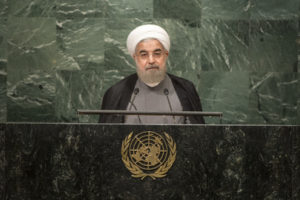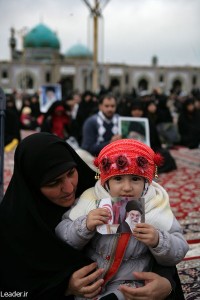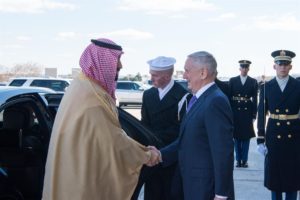Iran’s Victory for Moderation
Iranian President Rouhani’s solid reelection victory clears the way for Iran to continue its efforts to reengage with the global community and expand freedoms domestically, reports Trita Parsi.
The Iranian population’s political sophistication continues to impress. Despite a highly flawed political system where the elections are neither fair nor free, the overwhelmingly majority chose a non-violent path to bring about progress.

Hassan Rouhani, President of the Islamic Republic of Iran, addresses the United Nations General Assembly, Sept. 22, 2016 (UN Photo)
They massively participated in the elections with a 75 percent turnout – compare that to the turnout in the U.S. elections in 2016, 56 percent – and handed the incumbent moderate President Hassan Rouhani a landslide victory with 57 percent of the vote.
In a regional context, this election is even more remarkable. In most of the Middle East, elections are not even held. Take Saudi Arabia for instance, President Donald Trump’s choice for his first foreign trip.
There are a few things we can say about the meaning of the Iranian people’s collective action.
First of all, once again, Iranians voted against the candidate who was believed to be favored by Iran’s Supreme Leader Ayatollah Ali Khamenei. This is now a strong pattern.
Secondly, the Iranians rebuked exiled opposition groups and Washington hawks and neocons who called on the Iranian people to either boycott the elections or vote for the hardline candidate Ebrahim Raisi in order to hasten a confrontation. Clearly, these elements have no following in Iran.
Third, despite Trump’s undermining of the nuclear deal with Iran, and despite significant problems with the sanctions relief process which has left many Iranians disappointed in the nuclear deal, Iranians still chose diplomacy, detente and moderation over the confrontational line of previous Iranian administrations. Iran is today one of the few countries in the world where a message of moderation and anti-populism secures you a landslide election victory.
Human Rights Mandate
Fourth, despite Rouhani falling short on his promises to improve the human rights situation in Iran, Iranians and the leaders of the Green Movement leaders gave him a second chance. But now he has a stronger mandate – and fewer excuses. Now is the time for him to deliver on the promises that inspired tens of millions of Iranians to elect him twice as president.

An Iranian child holding a photo of Iran’s Supreme Leader Ali Khamenei at one of his public appearances. (Iranian government photo)
He must take decisive action to protect the human rights and civil liberties of the Iranian people, pursue improved relations with the world, and promote economic growth for the Iranian people. The hardline forces behind Iran’s arbitrary arrests and spiking executions may not answer to Rouhani directly, but the Iranian people who elected him expect him to do more in his second term to bring about change.
Failure to do so risks disenchanting a generation of Iranians from the belief that their voice can make a difference, potentially ceding Iran’s future to the hardline voices who would take the country back to isolationism and confrontation with the West.
Fifth, while Saudi Arabia is hosting Trump and pushing him to return to a policy of complete isolation of Iran, the European Union Foreign Policy head Federica Mogherini congratulated Rouhani on his election victory and recommitted the E.U. to the nuclear deal. The election results will strengthen the E.U.’s dedication to ensuring the deal’s survival as well as its commitment to an inclusive security framework for the Middle East.
Consequently, the E.U. will oppose Trump and Saudi Arabia’s attempt to stage a confrontation with Iran. This puts the Trump administration once again out of synch with Europe and the U.S.’s Western allies on a key security issue.
Diplomacy Over War
Sixth, Iranians have once again endorsed a policy of dialogue with the West, but the question is if Trump will unclench his fist and embrace this window for diplomacy. Just as the nuclear crisis was resolved through negotiations, the remaining points of conflict between the U.S. and Iran can also be resolved diplomatically, including Syria and Yemen. This is what the Middle East needs now – more diplomacy, not more arms sales.

Defense Secretary Jim Mattis welcomes Saudi Deputy Crown Prince and Defense Minister Mohammed bin Salman to the Pentagon, March 16, 2017. (DoD photo by Sgt. Amber I. Smith)
Seventh, Congress should avoid undermining the clear pro-engagement message sent by the Iranian people and empowering hardliners by pushing forward provocative sanctions legislation in the wake of the election results. New Senate sanctions are scheduled to be marked-up in committee this coming week. What a horrible response to the Iranian people after they voted for diplomacy and moderation.
Finally, the power struggle in Iran will increasingly shift towards the question of who will succeed Ayatollah Khamenei and become Iran’s next Supreme Leader. It is widely believed that Rouhani is eyeing this position. With his landslide victory, he has improved his prospects. To some extent, this is what this presidential election was really about.
Trita Parsi is the founder and president of the National Iranian American Council and an expert on US-Iranian relations, Iranian foreign politics, and the geopolitics of the Middle East. He is an award-winning author of two books, Treacherous Alliance – The Secret Dealings of Israel, Iran and the US (Yale University Press, 2007) and A Single Roll of the Dice – Obama’s Diplomacy with Iran (Yale University Press, 2012). He tweets at @tparsi.




Geen opmerkingen:
Een reactie posten